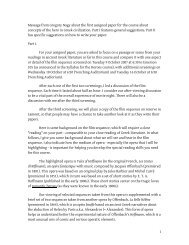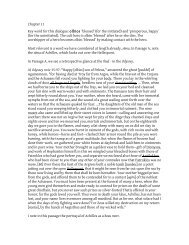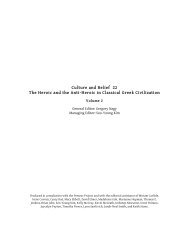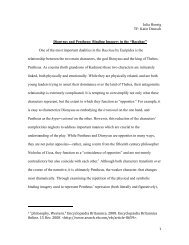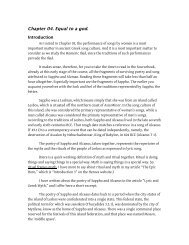Chapter 23 pdf
Chapter 23 pdf
Chapter 23 pdf
You also want an ePaper? Increase the reach of your titles
YUMPU automatically turns print PDFs into web optimized ePapers that Google loves.
Notes for Dialogue <strong>23</strong> - “The Living Word” Part II.<br />
[[I highlight here the splendid minutes of Franklin Zhao for the 2008 version of<br />
Dialogue <strong>23</strong>, stored in the archives of the Heroes site.]]<br />
[[I need to say at the beginning that Socrates, even though he is being set up to become<br />
a cult hero in Plato’s Apology and Phaedo, resists this role. That is why he is the first true<br />
Anti-Hero in this course. As I said at the very beginning of the course, the true ‘hero’ of<br />
this course is the word, the logos, as brought to life in dialogue, Socratic dialogue.]]<br />
The key word for this dialogue is sōzein (verb) ‘save; be a sōtēr (for someone)’; sōtēr<br />
‘savior’ (either ‘bringing to safety’ or, mystically, ‘bringing back to life’); sōtēria ‘safety,<br />
salvation’. I am not borrowing this concept of “savior” and “salvation” from Christian<br />
discourse. Christian discourse inherited the words sōtēr ‘savior’ and sōzein (verb) ‘save;<br />
be a sōtēr (for someone)’ from pre-Christian phases of the Greek language.<br />
A1. Let us examine this word in the context of the following passage, which is the<br />
beginning of Plato’s Phaedo:<br />
A) Plato’s Phaedo (57a-58c):<br />
Echecrates. [57a] Were you yourself, Phaedo, in the prison with Socrates on the day<br />
when he drank the poison [pharmakon]?<br />
Phaedo. Yes, Echecrates, I was.<br />
Ech. I wish that you would tell me about his death. What did he say in his last hours?<br />
We were informed that he died by taking poison [pharmakon], but no one knew<br />
anything more; for no Phliasian ever goes to Athens now, [57b] and a long time has<br />
elapsed since any Athenian found his way to Phlius, and therefore we had no clear<br />
account.<br />
Phaed. [58a] Did you not hear of the proceedings at the trial?<br />
Ech. Yes; someone told us about the trial, and we could not understand why, having<br />
been condemned, he was put to death, as appeared, not at the time, but long<br />
afterwards. What was the reason of this?<br />
Phaed. An accident [tukhē], Echecrates. The reason was that the stern of the ship which<br />
the Athenians send to Delos happened to have been garlanded [stephein] on the day<br />
before he was tried.<br />
Ech. What is this ship?<br />
Phaed. This is the ship in which, as the Athenians say, Theseus went to Crete when he<br />
took with him the fourteen youths, [58b] and was the savior [sōzein] of them and of<br />
himself. And they were said to have vowed to Apollo at the time, that if they were saved<br />
[sōzein] they would make an annual pilgrimage [theōria] to Delos. Now this custom still<br />
continues, and the whole period of the pilgrimage [theōria] to and from Delos, [58c]<br />
beginning when the priest of Apollo garlands [stephein] the stern of the ship, is the<br />
season of the theōria, during which the city is not allowed to be polluted by public<br />
executions; and often, when the vessel is detained by adverse winds, there may be a<br />
very considerable delay. As I was saying, the ship was garlanded [stephein] on the day
efore the trial, and this was the reason why Socrates lay in prison and was not put to<br />
death until long after he was condemned.<br />
I return to a question I posed the last time. Where was Plato when Socrates died? Plato<br />
was “weak” and couldn’t attend. To repeat, the single naming of Plato in the Phaedo is<br />
the only place, besides the single naming of Plato in the Apology, where Plato is<br />
mentioned at all in Plato’s own works. This authorial self-effacement is relevant to the<br />
objectives of Socratic dialogue.<br />
Earlier, we saw that Socrates composes a Hymn to Apollo, without the medium of writing<br />
(the word for ‘compose’ in this context is poieîn ‘make’ - not graphein ‘write’). The word<br />
that we translate as ‘hymn’ is prooimion. This word conveys the idea that a perfect<br />
beginning of a song is metonymically a perfect song in its entirety, even though that<br />
song is only potential in the prooimion.<br />
We now see, in the passage we are considering, that Theseus is the sōtēr of the city of<br />
Athens. The hero as sōtēr or ‘savior’ has been a central theme in this course. The<br />
occasion of ‘salvation’ here is the archetypal theōria of Theseus to Delos, where he<br />
celebrates his ‘salvation’ in Crete. In Plutarch’s Life of Theseus, we can read the details<br />
about the prototypical celebration in Crete. This celebration is re-enacted in the theōria<br />
from Athens to Delos and back. In Delos, the labyrinth of Crete is re-enacted by way of<br />
the “crane dance” at the festival of Apollo at Delos. The “crane dance” is the dance of<br />
the Cretan labyrinth (the labyrinth retraces the dance-steps of the “crane dance”).<br />
Delos is the site of this festival of Apollo, which becomes in the Phaedo the ritual frame<br />
for the pathos of Socrates. As we remember from the Apology, Socrates himself refers to<br />
his ordeal as his pathos, which he compares to the pathos of heroes in the heroic world.<br />
The ship of the theōria in ritual is a recreation of the prototypical ship of the theōria in<br />
myth. Notionally, it is the same ship, except that each of its parts has been replaced,<br />
one by one, in the course of time, so that the ship in the time of Socrates would have no<br />
piece in it that goes all the way back to the heroic age of Theseus. And yet, it is<br />
materially the exact replica of the “original” ship. The ship of the theōria in myth is the<br />
absolute ship, the ideal ship, comparable to an ideal ship in Plato’s theory of Forms,<br />
whereas the ship of the real world is not absolute, not ideal, just as the things of this<br />
world are not real in terms of Plato’s theory of Forms. The word in Greek that we<br />
translate as ‘Form’ is idea, and it is from this Greek word that such English words as<br />
idea, ideal, and idealism are borrowed. Of these borrowings, the adjective and noun<br />
ideal come closest to the philosophical concept of Form. (Another word that is used in<br />
Plato to express the idea of Form is eidos, which also conveys the idea of ‘genre’.)<br />
In general, I should stress that Plato’s Phaedo is like an introductory course on Plato’s<br />
theory of the Forms. “Forms 101,” as it were.<br />
The idea of salvation, which is notionally started (“launched”) by the notionally<br />
original theōria of Theseus, is to be continued by the theory that is generated by<br />
dialogue.
What is to be saved in Plato’s Phaedo is not the sōma of Socrates, not even his psukhē per<br />
se, but the word - that is, the word that he gets started by way of dialogue.<br />
These observations are relevant to the words stephein ‘to garland, to make garlands for’,<br />
and the derivative noun stephanos ‘garland’ that we saw in passage A. In Modern Greek,<br />
the word is stephanē (stepháni), likewise meaning ‘garland’. In the neuter plural, Modern<br />
Greek stéphana means ‘wedding garlands’; note the metonymy embedded in the phrase<br />
used to offer best wishes to newlywed couples: kalá stéphana. In one Modern Greek<br />
phrasebook for English-speakers, this expression is translated ‘may you have a quick<br />
and happy wedding’.<br />
Pictures of garlands. One picture shows an assortment of garlands on sale in a<br />
marketplace. The flowers that make up the garland in this case are sempreviva (in<br />
Venetian Italian, it means ‘eternally alive’; the local Greeks think it is a local Greek<br />
word). The locale is Cythera.<br />
The ritual of ‘garlanding’ (stephein) the stern of a ship is attested as far back as the 1600s<br />
BCE. In the frescos of Thera, we see the painting of a ship that features a cabin on the<br />
stern festooned with garlands. This practice survives to this day in the Greek-speaking<br />
world, on such festive occasions as Easter.<br />
When it comes to the treatment of traditional visions of immortalization involving<br />
Hades as a transition, we must beware of the translator’s (Jowett’s) assumptions as<br />
embedded in his translations. I offer the reader a general warning about Jowett’s<br />
translation “in the world below” (the Greek is simply ekei ‘over there’). In<br />
eschatological contexts, as in the Phaedo, the concept of Hades or “underworld” tends<br />
to be shaded over in the original Greek of Plato.<br />
The mystical language of immortalization is foregrounded in the Phaedo, as we see from<br />
the following passage:<br />
B) Plato Phaedo (69c):<br />
And I conceive that the founders of the mysteries [teletai] had a real meaning and were<br />
not mere triflers when they intimated in a figure [or ‘riddle’ = verb of ainigma] long ago<br />
that he who passes without initiation [amuētos] and without ritual induction [atelestos,<br />
from verb of telos] into the world below [= Hades] will live in a slough, but that he who<br />
arrives there after purification [= verb of katharsis] and induction [verb of telos] will<br />
dwell [verb of oikos] with the gods. For many, as they say in the mysteries [teletai], are<br />
the bearers of the thyrsos [narthēx], but few are the bakkhoi [= devotees of Bacchus].
We may compare again the Christian aphorism mentioned before: ‘many are called but<br />
few are chosen’ (Matthew 22:14). Examples of the unchosen are such “half-baked”<br />
initiates as Kadmos and Teiresias in the Bacchae of Euripides.<br />
What is at stake for Plato’s Socrates is not the resurrection of the body or the<br />
preservation of the psukhē but the resurrection of the word.<br />
The de-emphasis of corporeality can be seen even in the way the participants in the<br />
dialogue talk about remembering Socrates. It is *not* a matter of total recall. We see<br />
two people talking about Socrates, and one of the two, a man called Phaedo, makes<br />
extensive “quotations” from what he remembers Socrates said.<br />
When there is talk in the Phaedo about calling Socrates to mind, ‘to bring him to<br />
recollection’, the expression is memnēsthai + genitive. This is not total recall, which is<br />
expressed via memnēsthai + accusative.<br />
Also relevant to the question of corporeality is the word pharmakon in passage A. Let me<br />
stress, from the start, that pharmakon means not just ‘poison’; a better translation is<br />
‘potion’. A potion is a ritual drink (notice that Socrates has to drink the pharmakon). The<br />
semantics of libation are in effect. Note that Socrates, at the very end, wants to pour<br />
part of the potion into the ground as a libation. To whom? Here the idea of daimonion<br />
once again comes to mind.<br />
The effect of the pharmakon is either death or resurrection. In Plato’s Phaedrus, we learn<br />
that Socrates thinks of the technology of writing as a pharmakon. The pharmakon is the<br />
letter, that is, literacy, writing. The letter can kill the word or it can resurrect the word.<br />
We must keep this theme in mind when we come to the passage, later on, where<br />
Socrates says that he is ‘speaking like a book’. Or, more literally, he is speaking like an<br />
author who is communicating not by way of living speech but by way of speech<br />
embedded in a book. We see here a meditation on the fact that we as readers are<br />
introduced to Plato - or, in Plato’s terms, to Socrates - by way of a book. Initially,<br />
Socrates speaks to us as if he were a book, and yet, it is the live speech of dialogue that<br />
makes the word come alive. What matters is not his wording per se but the words that<br />
he is starting in dialogue, to be continued by his interlocutors and by succeeding<br />
interlocutors of generations to come, generation after generation, notionally forever.<br />
That is why the dialogues as framed by Plato are not authorial. That is why Socrates is<br />
not an author.<br />
C) Plato’s Phaedo (59d-60a):<br />
On the last morning the meeting was earlier than usual; [59e] this was owing to our<br />
having heard on the previous evening that the sacred ship had arrived from Delos, and<br />
therefore we agreed to meet very early at the accustomed place. On our going to the<br />
prison, the jailer who answered the door, instead of admitting us, came out and told us<br />
to wait and he would call us. “For the Eleven,” he said, “are now with Socrates; they are<br />
taking off his chains, and giving orders that he is to die today.” He soon returned and
said that we might come in. [60a] On entering we found Socrates just released from<br />
chains, and Xanthippe, whom you know, sitting by him, and holding his child in her<br />
arms. When she saw us she uttered a cry and said, as women will: “O Socrates, this is<br />
the last time that either you will converse with your friends, or they with you.”<br />
Socrates turned to Crito and said: “Crito, let someone take her home.” Some of Crito’s<br />
people accordingly led her away, crying out and beating herself.<br />
We see from this passage the terminus of the sacred time frame of the pathos of<br />
Socrates. The defining moment is now at hand. Consider the use of the word hōra by<br />
Socrates in the Apology.<br />
Note that the figure of Xanthippe with the child is more like that of Andromache with<br />
Astyanax than what is imagined in later philosophical traditions. Xanthippe laments<br />
the end of opportunities to have dialogues with Socrates in person. She laments this<br />
termination not only for the friends of Socrates, but also, implicitly, for herself. When<br />
Socrates says “take her away!” it is not so much an unfeeling attitude toward his wife. It<br />
is more a matter of Plato’s own compartmentalization of family vs. friends. When<br />
Socrates chooses to take a bath before his death, his gesture is worded as an act of<br />
consideration toward his wife and other women kinfolk. Of course it is also a symbolic<br />
gesture. No laments for Socrates. No bathing of Socrates’ corpse by the women of his<br />
family after he dies: no, he wants to take his last bath while he is still alive. All the<br />
sequences of funerary practice, which is the ideological basis of both the cult of the<br />
dead and hero-cult, seem to be challenged by Socrates.<br />
D) Plato’s Phaedo (60e-61b):<br />
In the course of my life I have often had intimations in dreams “that I should make<br />
music [mousikē].” The same dream came to me sometimes in one form, and sometimes<br />
in another, but always saying the same or nearly the same words: Make and cultivate<br />
music [mousikē], said the dream. [61a] And hitherto I had imagined that this was only<br />
intended to exhort and encourage me in the study of philosophy, which has always<br />
been the pursuit of my life, and is the noblest and best of music [mousikē]. The dream<br />
was bidding me to do what I was already doing, in the same way that the competitor in<br />
a race is called on by the spectators to run when he is already running. But I was not<br />
certain of this, as the dream might have meant music [mousikē] in the popular sense of<br />
the word, and being under sentence of death, and the festival giving me a respite, I<br />
thought that I should be safer if I engaged with the holiness, [61b] and, in obedience to<br />
the dream, composed a few verses before I departed. And first I made a hymn [humnos]<br />
in honor of the god of the festival, and then considering that a poet, if he is really to be<br />
a poet or maker, should not only put words together but make stories [muthoi], and as I<br />
am not a maker of stories [muthologikos], I took some fables [muthoi] of Aesop, which I<br />
had ready at hand and knew, and turned them into verse.<br />
I repeated this passage here because I need to stress once again the symbolic value of<br />
the humnos ‘hymn’ as an inauguration of “music” still to come.<br />
E) Plato’s Phaedo (88c-89c):
[[Here Echecrates interrupts the narrative of Phaedo containing the dialogue of<br />
Socrates with Phaedo and others. The interruption of the narrative is like a derailment<br />
of the dialogue contained by the narrative.]]<br />
Ech. There I feel with you - I do, Phaedo, and when you were speaking, I was beginning<br />
to ask myself the same question: [88d] What argument can I ever trust again? For what<br />
could be more convincing than the argument of Socrates, which has now fallen into<br />
discredit? That the psukhē is a tuning [harmonia] is a doctrine which has always had a<br />
wonderful attraction for me, and, when mentioned, came back to me at once, as my<br />
own original conviction. And now I must begin again and find another argument which<br />
will assure me that when the man is dead the psukhē dies not with him. Tell me, I beg,<br />
[88e] how did Socrates proceed? Did he appear to share the unpleasant feeling which<br />
you mention? or did he receive the interruption calmly and give a sufficient answer?<br />
Tell us, as exactly as you can, what passed.<br />
[[Here the narrative of Phaedo containing the dialogue of Socrates with Phaedo and<br />
others is resumed after the interruption, after the derailment.]]<br />
Phaed. Often, Echecrates, as I have admired Socrates, I never admired him more than at<br />
that moment. [89a] That he should be able to answer was nothing, but what astonished<br />
me was, first, the gentle and pleasant and approving manner in which he regarded the<br />
words of the young men, and then his quick sense of the wound which had been<br />
inflicted by the argument, and his ready application of the healing art. He might be<br />
compared to a general rallying his defeated and broken army, urging them to follow<br />
him and return to the field of argument.<br />
Ech. How was that?<br />
Phaed. You shall hear, for I was close to him on his right hand, seated on a sort of stool,<br />
[89b] and he on a couch which was a good deal higher. Now he had a way of playing<br />
with my hair, and then he smoothed my head, and pressed the hair upon my neck, and<br />
said: Tomorrow, Phaedo, I suppose that these fair locks of yours will be severed. Yes,<br />
Socrates, I suppose that they will, I replied. Not so if you will take my advice. What shall<br />
I do with them? I said. Today, he replied, and not tomorrow, if this argument dies and<br />
cannot be brought to life again [anabiōsasthai] by us, you and I will both shave our locks;<br />
[89c] and if I were you, and could not maintain my ground against Simmias and Cebes, I<br />
would myself take an oath, like the Argives, not to wear hair any more until I had<br />
renewed the conflict and defeated them. Yes, I said, but Herakles himself is said not to<br />
be a match for two. Summon me then, he said, and I will be your Iolaos until the sun<br />
goes down. I summon you rather, I said, not as Herakles summoning Iolaos, but as<br />
Iolaos might summon Herakles.<br />
As David Elmer pointed out (2004), we see here the first moment in the inset narrative<br />
of Phaedo where “the frame narrative breaks into the inset narrative” (this moment<br />
happens when Echecrates interrupts the inset narrative of Phaedo). Elmer continues:<br />
“This moment is just exactly after Socrates has asked someone else to respond to the<br />
objections of Simmias. In the inset narrative, Socrates then turns to Phaedo himself,<br />
who is the frame narrator to Echecrates.” After the objections of Simmias and Cebes,<br />
the dialogic partners of Socrates are at a loss, clearly. So the interruption by Echecrates<br />
happens at the moment when the flow of argumentation has in any case been<br />
interrupted by the inability of the dialogic partners to come up with a good response to
the objections of Simmias and Cebes. The dialogic partners’ model of immortality,<br />
which is pictured for them as the perfect tuning (harmonia) of the seven-string lyre, has<br />
been shattered. It is also being shattered for Echecrates, who expresses his feelings of<br />
despair to Phaedo as he interrupts Phaedo’s inset narrative. (On the concept of the<br />
shattered tuning . . . GN compares the tragedy Thamyras by Sophocles, where the lyre of<br />
Thamyras the singer disintegrates while he is playing it.)<br />
To compare Socrates to Herakles as someone that needs to be ‘summoned’ in an hour of<br />
need has one meaning in the world of heroes (the young nephew Iolaos ‘summons’<br />
Herakles to help him in his hour of need - and vice versa) and another meaning in the<br />
world of the present, when worshippers are worshipping heroes (the worshippers<br />
‘summon’ Herakles to help them in their hour of need). When Herakles is fighting solo<br />
against two, even he needs the help of his nephew Iolaos. After Socrates is dead, Phaedo<br />
will not be able to fight against the likes of Simmias and Cebes. That would be a oneagainst-two<br />
fight. The dialogic partner of Socrates, Phaedo, wants to summon Socrates<br />
from the dead as if Socrates were Herakles. Phaedo can be Iolaos to the Socrates as<br />
Herakles, although Socrates thinks that he can be Iolaos and let Phaedo be Herakles in a<br />
debate with Simmias and Cebes. Either way, Socrates would be dead, and the living<br />
dialogic partner would have to team up with the dead words of Socrates who is shown<br />
engaging in dialogue inside a book. These dead words can be made to come alive only in<br />
a “live dialogue.”<br />
F) Plato Phaedo (102d): He [= Socrates] added, laughing, I am speaking like a book<br />
[sungraphikōs erein], but I believe that what I am now saying is true.<br />
G) Plato Phaedo (117a-118a):<br />
Crito, when he heard this, made a sign to the servant, and the servant went in, and<br />
remained for some time, and then returned with the jailer carrying a cup of poison<br />
[pharmakon]. Socrates said: You, my good friend, who are experienced in these matters,<br />
shall give me directions how I am to proceed. The man answered: You have only to<br />
walk about [117b] until your legs are heavy, and then to lie down, and the poison will<br />
act. At the same time he handed the cup to Socrates, who in the easiest and gentlest<br />
manner, without the least fear or change of color or feature, looking at the man with all<br />
his eyes, Echecrates, as his manner was, took the cup and said: What do you say about<br />
making a libation out of this cup to any god? May I, or not? The man answered: We only<br />
prepare, Socrates, just so much as we deem enough. I understand, he said: [117c] yet I<br />
may and must pray to the gods to prosper my journey from this to that other world—<br />
may this, then, which is my prayer, be granted to me. Then holding the cup to his lips,<br />
quite readily and cheerfully he drank off the poison. And hitherto most of us had been<br />
able to control our sorrow; but now when we saw him drinking, and saw too that he<br />
had finished the draught, we could no longer forbear, and in spite of myself my own<br />
tears were flowing fast; so that I covered my face and wept over myself, for certainly I<br />
was not weeping over him, [117d] but at the thought of my own calamity in having lost<br />
such a companion. Nor was I the first, for Crito, when he found himself unable to<br />
restrain his tears, had got up and moved away, and I followed; and at that moment.<br />
Apollodorus, who had been weeping all the time, broke out in a loud cry which made
cowards of us all. Socrates alone retained his calmness: What is this strange outcry? he<br />
said. I sent away the women mainly in order that they might not offend in this way,<br />
[117e] for I have heard that a man should die in peace. Be quiet, then, and have<br />
patience. When we heard that, we were ashamed, and refrained our tears; and he<br />
walked about until, as he said, his legs began to fail, and then he lay on his back,<br />
according to the directions, and the man who gave him the poison now and then looked<br />
at his feet and legs; and after a while he pressed his foot hard and asked him if he could<br />
feel; and he said, no; and then his leg, [118a] and so upwards and upwards, and showed<br />
us that he was cold and stiff. And he felt them himself, and said: When the poison<br />
reaches the heart, that will be the end. He was beginning to grow cold about the groin,<br />
when he uncovered his face, for he had covered himself up, and said (they were his last<br />
words)—he said: Crito, I owe the sacrifice of a rooster to Asklepios; will you remember<br />
to pay the debt? The debt shall be paid, said Crito; is there anything else? There was no<br />
answer to this question; but in a minute or two a movement was heard, and the<br />
attendants uncovered him; his eyes were set, and Crito closed his eyes and mouth. Such<br />
was the end, Echecrates, of our friend, whom I may truly call the wisest, and most just,<br />
and best of all the men whom I have ever known.<br />
In the figure of the hero Asklepios, we see the theme of resurrection. For Socrates, what<br />
matters is the resurrection of the word.<br />
Death is the necessary pharmakon for leaving the everyday life and for entering the<br />
everlasting cycle of resurrecting the word.




